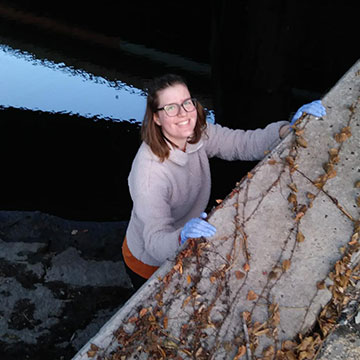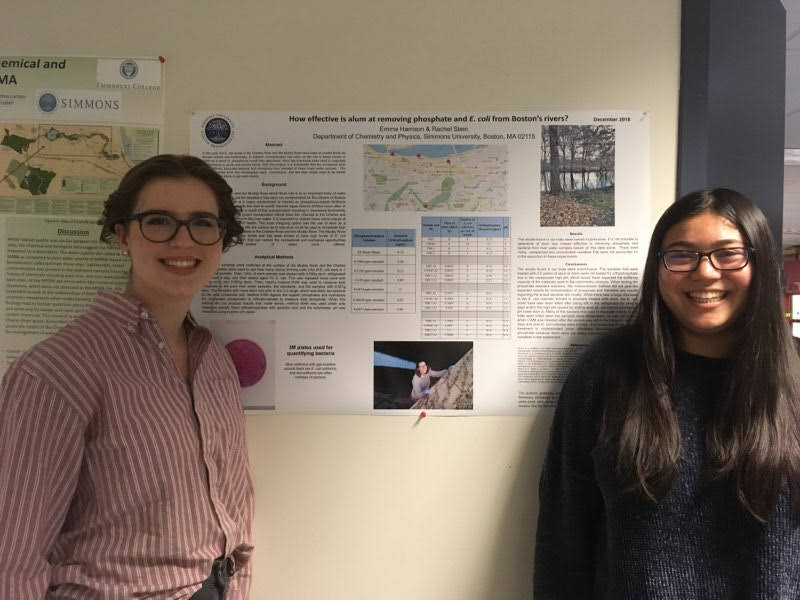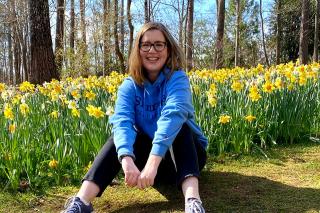What were you looking for in a college during your college search process?

Since the very beginning of my college search, I knew that I wanted a small school that allowed students to explore a wide range of fields. Location was also important to me — I mainly looked at west coast schools initially, but when I visited Boston to tour Simmons, I absolutely fell in love with the history in Boston.
Most importantly, I was looking for a strong sense of community. Community is one of my major values, and I knew that my success in higher education would rely heavily on an uplifting school community alongside rigorous academics. I feel so lucky that I was able to find all of these and more at Simmons!
What inspired you to pursue a BS in biochemistry?
I came into college with an undeclared major, and I was completely overwhelmed with the huge range of majors I could pursue. However, I thoroughly enjoyed my science courses in high school, and I was considering pursuing a career in the medical field.
For this reason, when I was given the opportunity to join the "Advanced Biology and Chemistry Learning Community" in my first year, I jumped at the opportunity. This learning community only deepened my love of science. The support I had from my professors and peers gave me the confidence I needed to consider a career in STEM seriously. I know that I wanted chemistry to be a significant part of my major, but I found myself constantly being drawn to the intersection of biology and chemistry. I highly value interdisciplinary learning, and the biochemistry major at Simmons allowed me to bridge the gaps between the two subjects and make new connections.
I feel so lucky that I was able to find all of these and more at Simmons!
What PLAN courses have you taken?
My Boston course was titled "Speech Communities in Boston." In this class, we discussed the linguistic landscape of Boston and how it impacted different communities throughout the city, with particular attention paid to marginalized communities. We took this learning outside of the classroom and experienced the linguistic diversity of Boston by exploring places all around the city.
I also took the "Advanced Biology and Chemistry Learning Community," where we dove deep into upper-level chemistry and biology topics. We covered a wide range of topics that brought chemistry and biology together, and the learning community ended with a student-directed independent research project.
My final PLAN course was my leadership course: "Political Leadership of Women in TV and Film." In this course, we analyzed how representations of women and other minorities changed over the history of film and television.
What lessons were especially impactful from these courses?
I adored all of my PLAN courses for vastly different reasons. As a student from outside of New England, I knew very little about Boston's history before moving here. My Boston course allowed me to engage with the city in a very real way. Studying language was a path through which we could easily understand other issues that profoundly influence the current landscape of Boston, such as racism, elitism, and gentrification. I still reflect on many of the lessons I learned through this course as I engage more deeply with different communities in the Boston area.
As for my learning community, I'm especially grateful for the lessons I gained through these courses. This experience was a significant factor in my decision to pursue a degree in biochemistry. It gave me such a strong foundation in science concepts that continue to help me in my science courses today. My learning community allowed me to get a taste of what real scientific research looks like and continues to aid me as I conduct research for my senior thesis. This early exposure to research makes me excited to make real contributions to scientific fields and has helped inform my future career paths.
I learned so much through my leadership course, but perhaps the most important lesson was how special it is to be in an academic space with peers who inspire and uplift you. This class had such a wonderful sense of community, and I still keep in touch with friends I made there.
I still reflect on many of the lessons I learned through this course as I engage more deeply with different communities in the Boston area.
Tell us about the practical applications of your learning community.
One aspect of the work we did in the "Advanced Biology and Chemistry Learning Community" was studying environmental chemistry through experiential learning with the Muddy River. This riverway passes right outside of the Simmons academic campus and empties into the Charles River. Throughout multiple labs, we examined the presence of metal contaminants in Muddy River sediment.
Then, we tested the efficacy of a range of biosorbents in their capacity to remove and contain these contaminants. Biosorbents are organic materials that have natural absorptive effects; our biosorbents were made of dried fruit material! This project forced us to leave the comfort of the lab and engage directly with the outside world in a real and meaningful way. Through this research, we found very high concentrations of some key metal contaminants, including arsenic, lead, and copper. However, our results were promising because these concentrations were lower than previous years, indicating that ongoing Muddy River restoration projects were working.
Our biosorbent experiments also found that certain fruit matter was very effective in taking up metal contaminants from water, demonstrating that biosorbents could be an effective method of waterway cleanup projects.

Tell us about your virtual learning experience and transitioning back to campus.
One of the most important lessons I gained from our year online is the importance of flexibility. Our world, in general, evolves so rapidly, but this year showed us just how quickly things can change. However, so many people took this change in stride and made the best of it, including the vast majority of Simmons professors. Because of our collective flexibility as an academic community, I was able to feel supported by Simmons when I was thousands of miles away, and I learned so many new skills that I wouldn't have otherwise.
My favorite thing about being back on campus is feeling the full weight and strength of the Simmons community. Simmons truly is a home to me, and returning after such a long time away felt like visiting an old friend. I love all of the small things that come with being back on campus: waving to friends in the quad, sitting with classmates in Common Grounds, and catching up with your favorite professors during lab. This community is so special, and I feel so fortunate to be a part of it.
This community is so special, and I feel so fortunate to be a part of it.
How is Simmons preparing you to become an everyday leader?
Simmons is allowing me to grow into my full potential as a leader by allowing me to take on leadership roles inside and outside of the classroom. I have been given so many opportunities to challenge myself and gain new skills and perspectives, none of which I would have had the confidence to pursue without encouragement from my peers and professors. Simmons professors often incorporate professional development into their curriculum, so I feel well-prepared to enter the workforce after graduation.

